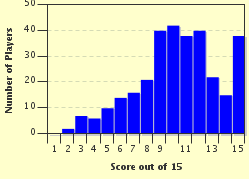Quiz Answer Key and Fun Facts
1. To most people, the "front of the house" refers to that portion of a dwelling oriented toward the street which includes the front porch and the front door. What is the "front of the house" in the theatre?
2. Cattle are domesticated bovines such as bulls, steers, cows, and oxen, raised for their meat or for dairy products. What is a cattle call in the theatre?
3. A barn door is that which is too often closed after the horse has been stolen. It is also a colloquial term for the fly in a gentleman's trousers. What is meant by the theatrical term "barn door"?
4. Birds and airplanes have wings, Paul McCartney and his wife Linda McCartney had Wings, and political parties have wings. What are the wings in a theatre?
5. A blackout is what happens when a geographic area loses its electrical power. It is also what happens when a person consumes so much alcohol that they are unable to later recall what they said and did. In the theatre, what is a blackout?
6. Cities are divided into blocks, Lucy van Pelt refers to both Charlie Brown and her brother Linus as blockheads, and offensive players in American football are responsible for blocking defensive players to prevent them from tackling the player with the ball. What is the meaning of "blocking" in the theatre?
7. One of the meanings of "curtain" in the theatre is the actual drape of large fabric which rises and falls at the beginning or the end of a play. What else does "curtain" mean in the theatre?
8. While there is nothing funny about a dead body, instances of "corpsing" in the theatre can be hysterically funny. What is meant, in theatrical terms, by the verb "to corpse"?
9. A cameo is the figure of a human head carved in relief on a gemstone or piece of shell, especially where the background material is of a different colour than the head. What is a cameo in the theatre?
10. Both the Theatre Royal Drury Lane in London and the Paris Opera's Palais Garnier theater are reputed to be haunted. Shakespeare's "Macbeth" is reputed to be haunted. In a theatre, what is the ghost light?
11. Germany had the Berlin Wall, the Prophet Daniel read the handwriting on the wall to King Belshazzar, and the comedy of Jonathan Winters was off the wall. What is the fourth wall in a theatre?
12. Prunes have a pit and race cars stop in a pit and Edgar Allan Poe apparently believed that pits go together nicely with pendula. What is the pit in a theatre?
13. Some chocolate is dark, some humour is dark and, according to the novelist Philip Pullman, some materials are dark. What does it mean to say that a theatre is dark?
14. Angry employees go on strike, bowlers bowl a strike, and generals call in an airstrike. What does the verb "strike" mean in the context of the theatre?
15. Seraphim and cherubim are angels, oysters wrapped in bacon are called angels on horseback, and Ben Jonson called nightingales "the angels of Spring." What is an angel, in connection with the theatre?
Source: Author
FatherSteve
This quiz was reviewed by FunTrivia editor
LadyCaitriona before going online.
Any errors found in FunTrivia content are routinely corrected through our feedback system.

